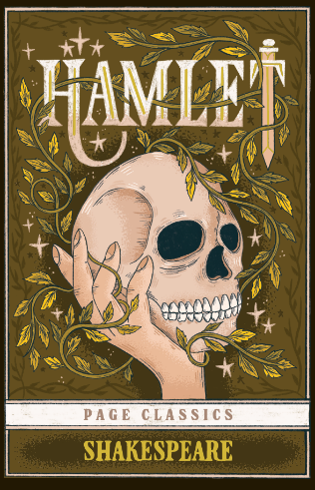Hamlet William Shakespeare
- Normaler Preis
- $7.50 USD
- Normaler Preis
-
$14.99 USD - Verkaufspreis
- $7.50 USD
- Grundpreis
- pro
Type : Classic Literature
SKU : 9781648337277
Verfügbarkeit für Abholungen konnte nicht geladen werden
Hamlet, Prince of Denmark, written by William Shakespeare, is one of the most famous and influential tragedies in Western literature. The play opens with Prince Hamlet returning to Denmark from his studies to mourn the death of his father, King Hamlet, who has passed away under mysterious circumstances. The grief-stricken Hamlet is further disturbed by the swift remarriage of his mother, Queen Gertrude, to his uncle, Claudius, the brother of the late king, who now ascends to the throne.
The play begins with Hamlet’s disillusionment and anger over his mother’s hasty marriage to Claudius, whom Hamlet views as morally corrupt and unworthy of the throne. Hamlet is disgusted by what he perceives as his mother’s betrayal of his father’s memory, and he struggles with deep feelings of betrayal, grief, and resentment.
In Act 1, Hamlet is visited by the ghost of his father, who reveals that he was murdered by Claudius in order to seize the throne. The ghost urges Hamlet to avenge his death. This revelation sets in motion the central conflict of the play: Hamlet's internal struggle between the desire for revenge and his hesitation to act. Hamlet grapples with moral questions about justice, vengeance, and the consequences of action, often contemplating the nature of life and death itself.
As the play progresses, Hamlet becomes increasingly erratic and indecisive, alienating those around him, including his love, Ophelia, and his friends, Rosencrantz and Guildenstern. The theme of appearance versus reality runs throughout the play, as Hamlet feigns madness to uncover the truth and to gain the upper hand over Claudius, who becomes increasingly paranoid about Hamlet's intentions.
Key Themes in Hamlet:
- Revenge and Justice: Hamlet's quest to avenge his father's murder raises important questions about the ethics of revenge and whether it is morally justifiable to take action in the face of perceived wrongs.
- Existentialism and the Meaning of Life: Hamlet’s famous soliloquy, "To be or not to be, that is the question," is a meditation on life, death, and the human condition, reflecting his deep existential crisis.
- Corruption and Decay: The theme of moral and political corruption is prevalent, with Claudius symbolizing the decay of Denmark's moral fabric, and Hamlet’s struggle to find justice representing the attempt to restore order.
- Madness: Hamlet’s feigned madness, Ophelia’s actual madness, and the questioning of what is real versus what is imagined are central to the play’s complexity.
The tragic outcome of Hamlet's pursuit of vengeance culminates in a bloody final act. As Hamlet finally kills Claudius, he also succumbs to his own wounds, and nearly everyone in the royal family is left dead. Fortinbras, the Prince of Norway, arrives to claim the throne of Denmark, bringing an end to the royal family’s bloodline.
Hamlet remains one of Shakespeare’s most studied plays, as it explores universal themes of betrayal, revenge, moral conflict, and the human condition. Hamlet’s complex character and his philosophical reflections continue to resonate with audiences and readers across the centuries.
5.1 x 7.87 (Inches)
186 Pages



